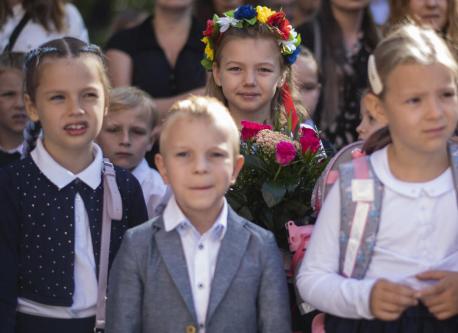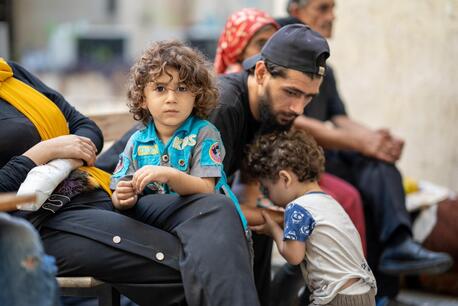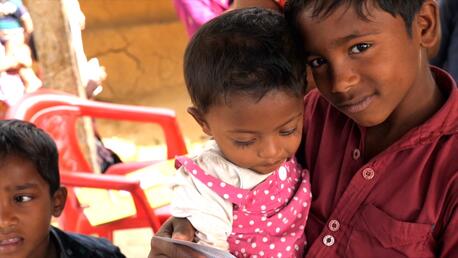
Ukrainian Refugees Head Back to School in Poland
The excitement of the first days of school is complicated this year for the estimated 2.2 million Ukrainian children who have fled to safety in neighboring countries. Cut off from the lives they once knew, refugees from Ukraine need the comfort and stability of a welcoming school community now more than ever.
This year, 80 of the 450 students at Janusz Korczak School #12 in Krakow, Poland, come from Ukraine. With support from UNICEF, the school offers not only access to quality education, aided by six Ukrainian intercultural assistants, but also psychosocial support for students and their families, after-school activities and free participation in extracurricular classes.

"We open our doors to all children, and we do not differentiate by the country they come from or the language they speak," said the school's principal, Magdalena Mazur. "Quality education is the right of every child and we do our best to provide it."

“Of course, I wish I could go back to Ukraine, but not until it’s safe there," said 12-year-old Sofia, from Irpin. "If I were back home now, I would have to attend school online. I really did not want that. Going to school is much better, it’s so much fun to be with friends, hang out, talk, learn and play together.”

Eager to be a part of the school community, students listened carefully as a teacher went over the classroom rules on the first day.

Sisters Yevheniia, 19, above left, and Katya, 12, come from Bucha, Ukraine. Yevheniia is one of Januscz Korczak School #12's intercultural assistants; Katya's in the seventh grade.
Yevheniia arrived in Krakow in 2020 to study pedagogy. She was interning at the school when the war broke out in February 2022, and continued to work as a volunteer as the school began to accept children arriving from Ukraine. “We were all helping each other," she said. "I was helping the children and parents, who did not know the language or any procedures on how to enroll in school. The school was helping the families with clothing and other items, as most of them had left their homes in a hurry, with nothing."
Some of Yevheniia's school colleagues drove her to the Ukraine border to bring Katya to safety. "Now she lives with me here," Yevheniia said. "On Sept. 1, she started school here. We feel very welcome, and at the same time, I feel that what I do here is helping a lot of children and their parents.”

Seven-year-old Emilia brought two bouquets of flowers to school on the first day, one for her tutor and one for the principal.
“I don’t know anyone in my class yet," she said. "But I think I will meet my future best friend today. When we grow up, she will say, 'I remember first seeing you, you had flowers in your hair.' And we will laugh together.”
UNICEF is partnering with Poland's Ministry of Education and Science to continue delivering on the rights of children
The forced displacement caused by the war, at a scale and speed not seen since World War II, has seen Poland welcome the majority of refugees who've left Ukraine in search of safety. Around 460,000 school-aged children have registered for temporary protection in Poland; it's likely that the actual number is much higher.
Working in partnership with Poland's Ministry of Education and Science, UNICEF is supporting teacher training on learning Polish as a second language, helping with recruitment of Ukrainian teachers and distributing IT equipment to speed up language learning, school kits, classroom furniture and other education supplies.
UNICEF is working to get every child back to learning, both in refugee-hosting countries and inside Ukraine. Your contribution can make a difference. Please donate today.
Top photo: Seven-year-old Emilia, a refugee from Irpin, Ukraine, wore flowers in her hair on the first day of school at Januscz Korczak School #12 in Krakow, Poland, on Sept. 1, 2022. The school welcomed 80 Ukrainian refugee children. UNICEF is working to provide schools in refugee-hosting countries with the resources they need to meet the needs of all their students. © All photos by Michal Korta for UNICEF
HOW TO HELP
There are many ways to make a difference
War, famine, poverty, natural disasters — threats to the world's children keep coming. But UNICEF won't stop working to keep children healthy and safe.
UNICEF works in over 190 countries and territories — more places than any other children's organization. UNICEF has the world's largest humanitarian warehouse and, when disaster strikes, can get supplies almost anywhere within 72 hours. Constantly innovating, always advocating for a better world for children, UNICEF works to ensure that every child can grow up healthy, educated, protected and respected.
Would you like to help give all children the opportunity to reach their full potential? There are many ways to get involved.




